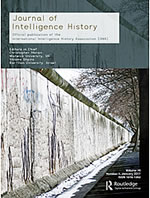The latest issue of the well-known Journal of Intelligence History, the official publication of the International Intelligence History Association (IIHA) contains the following articles: John Moran’s British military intelligence in aid of the civil power in England and Wales; Rhodri Jeffrey-Jones’ The sensitivity of SIGINT: Sir Alfred Ewing̕s lecture on room 40 in 1927, John Matz’ The Konnov/Mikhailov/Bakourskii espionage crises of July-August 1947 and Vyshinskii note on Raoul Wallenberg, Adam Leong Kok Wey’s Japanese intelligence and covert operations: a strategic evaluation of Fujiwara Kikan in the invasion of Malaya and Singapore, 1941-1942; Giovanni Coletta’s Politicising intelligence: what went wrong with the UK and US assessments on Iraqi WMD in 2002, and a review article entitled The Gatekeepers: film, television series, and book review, signed by Eyal Paskovich. Inciting titles and well-known authors entice the reader to deepen his knowledge of historical events involving intelligence services.
Without reducing the importance of one or another articles mentioned we would like to emphasize that signed by Jon Moran, entitled British military intelligence in aid of the civil power in England and Wales. In this article, the author attempts to uncover the beginning of the intelligence cooperation between the British Army and the state’s civilian and administrative institutions at the end of the XIX century and the beginning of the XX. This aspect is remarkably lacking in Romanian intelligence historiography.
According to Jon Moran, to deeply understand the creation of the modern intelligence structures, one needs to emphasize the role played by the representatives of civil authorities, that is mayors, prefects, junior prefects and local police chiefs, given that these local magistrates are the main guarantors of public order and the primary holders of information on state security.
In order to reconstruct the mechanism of intelligence collection, Jon Moran advises one to look at the legal framework on public gatherings valid during that period and at the way that state structures were mandated to intervene in cases of social disorder, rebellion, anarchist movements, attacks and strikes. The author notices the British did not have a military organization to permanently and systematically collect intelligence, which was initially done by local organs of civil intelligence. Hoping that we have sparked your interest for this issue of the Journal of Intelligence History, we wish you a pleasant reading.

